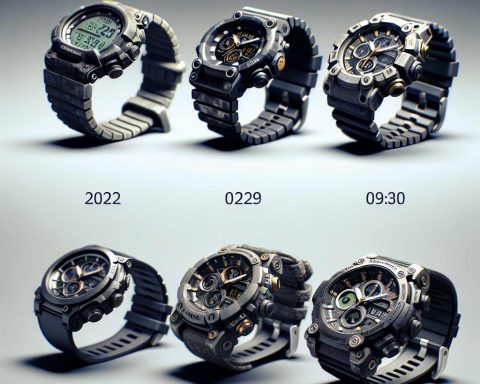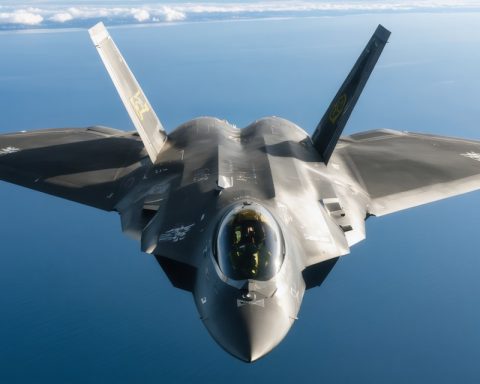- Britain plays a crucial role in the F-35 jet programme, contributing 15% of each aircraft, alongside nations like the US, Italy, and Australia.
- The UK faces ethical challenges due to Israel’s use of F-35 jets, with concerns over human rights implications.
- Critics, including Amnesty International, argue this involvement risks breaching international law and damaging the UK’s ethical image.
- Opposition from groups such as pro-Palestine advocates highlights the potential for regional tensions and international legal violations.
- Maintaining participation in the programme is vital for the UK economy, supporting thousands of jobs critical to the defense sector.
- Political and defense figures contend that the UK’s reliability as an ally is crucial, emphasizing the economic and strategic importance of the F-35.
- The UK aims to become a “defense industrial superpower,” balancing economic growth with international defense collaboration.
Amidst the hum of factory floors and strategic international negotiations lies Britain’s quandary: how to reconcile its role in the F-35 jet programme with mounting ethical concerns. A cornerstone of military collaboration, the F-35 project involves a dozen nations, prominently including the United States, Italy, and Australia. On the forefront of this initiative stands Britain, with its defense titan, BAE Systems, engineering roughly 15% of each aircraft, marking the UK as an integral player in this complex geopolitical chess game.
Yet in the shadows of these technological marvels, a storm brews. The involvement of Israel as a significant operator of these jets has ignited a controversy stretching beyond mere mechanics into the realm of morality. Critics argue that components made in the UK, if used in conflicts marked by human rights scrutiny, could tarnish the ethical standing of the nation. The defense experts caution, however, that any attempt to impose stricter export conditions could unravel London’s deeply sewn threads in this international fabric, potentially side-lining them in lucrative future collaborations.
The tapestry of opposition is vibrant. Pro-Palestine advocacy groups have staged protests, drawing attention to Britain’s role in what they see as the exacerbation of regional tensions. Amnesty International and others boldly assert that continuing this arms trade ignores international legal obligations, resulting in palpable harm. Meanwhile, a faction within the British Parliament voices their hesitation, concerned that aiding Israel’s military might infringe on international accords like the Geneva Conventions.
Despite these contentions, a compelling argument to maintain the status quo persists within British discourse. Former ministers and defense experts alike stress the disastrous implications of being deemed an unreliable ally. The economic stakes are immense, underpinned by thousands of jobs dependent on the F-35 production pipeline—a significant portion of which thrives in politically sensitive regions such as the North West of England.
Labour MP Luke Akehurst passionately underscores that the programme bolsters jobs and international cooperation, suggesting jeopardizing such ties could cripple the nation’s defense capabilities. These sentiments collate with broader government ambitions, encapsulated in Chancellor Rachel Reeves’ recent declaration to transform the UK into a “defense industrial superpower.” This vision strategically aligns with bolstering internal growth and securing Britain’s place on the global industrial stage.
Through a lens of geopolitical strategy, economic necessity, and ethical debate, the UK continues its precarious balancing act. As alliances bridge continents and jobs fortify local economies, the future of Britain’s defense industry might very well hinge on its ability to navigate the thorny trail between global collaboration and regional ethics—a high-wire act that demands deft maneuvering. The ultimate takeaway? A nation must tread carefully, weighing immediate economic gains against long-term reputational risks in the intricate web of international defense politics.
Controversial Ties: The F-35 Jet Programme’s Hidden Ethical Dilemmas
Understanding the F-35 Jet Programme
The F-35 Lightning II, a multirole stealth fighter, is a testament to international collaboration in defense technology. Spearheaded by Lockheed Martin, this cutting-edge fighter jet involves the participation of the United States, United Kingdom, Italy, Australia, and several other countries. The UK, through its giant BAE Systems, fabricates about 15% of each aircraft, underscoring its essential role.
Key Features of the F-35 Jet
– Stealth Capability: The F-35 is designed to evade radar detection, providing an edge in combat operations by ensuring a low observable profile.
– Advanced Sensors: It houses sophisticated sensor technologies for comprehensive situational awareness and multi-domain warfare.
– Supersonic Speed and Agility: Engineered for versatility, the F-35 can execute air-to-air and air-to-ground missions with precision.
The Ethical Quandary: Britain’s Role and Responsibilities
The core controversy circles around the UK’s involvement in manufacturing components for these jets, especially when exported to countries involved in contentious conflicts. Israel, a significant operator of the F-35, figures prominently due to its ongoing military engagements marked by human rights debates.
Ethical Concerns
1. International Human Rights Violations: Critics worry that using UK-manufactured technology in conflicts scrutinized for human rights abuses might tarnish Britain’s ethical credentials.
2. Compliance with International Law: Organizations like Amnesty International assert that the arms trade often breaches international laws like the Geneva Conventions.
3. Impact on Diplomatic Relations: The continuation of arms supplies to volatile regions could strain Britain’s diplomatic relationships and affect its standing in international arenas.
Balancing Economic Interests and Ethics
Despite ethical concerns, the economic imperatives are substantial. The F-35 programme sustains thousands of jobs, especially in economically sensitive regions like the North West of England. This economic dependency underscores a broader strategic vision for the UK to become a “defense industrial superpower,” as articulated by political figures like Chancellor Rachel Reeves.
Real-World Use Cases & Market Insights
– National Security Enhancement: The F-35 serves as a critical deterrent, strengthening national defense policies.
– Job Creation: The aerospace and defense sector significantly boosts employment, contributing to local economies.
– International Collaboration Opportunities: Participation in such international projects fosters military and geopolitical alliances.
Industry Trends and Predictions
– Rising Military Budgets Globally: With increasing geopolitical tensions, many nations, including the UK, are augmenting defense budgets, potentially expanding opportunities for higher participation in defense programmes.
– Technological Advancements: Ongoing technological innovations are likely to propel the F-35’s capabilities, enhancing operational effectiveness and maintaining competitive advantage in global sales.
Actionable Recommendations
1. Strengthen Ethical Oversight: Establish stringent monitoring systems to ensure compliance with international human rights standards concerning military exports.
2. Diversify Defense Investments: The UK should consider diversifying its defense industry investments, focusing on non-controversial sectors to balance economic benefits with ethical obligations.
3. Conduct Transparent Policy Reviews: Transparent discussions and policy reviews involving stakeholders from different arenas, including defense experts, human rights advocates, and economists, can guide the UK’s future actions in defense collaborations.
By balancing strategic priorities with ethical considerations, Britain can seek to retain its prominent position in global defense while upholding its commitment to international norms and values. For more insights into the dynamics of international defense collaborations, visit BAE Systems.











